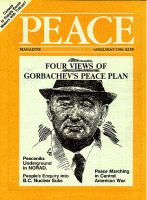
Peace Magazine Apr-May 1986, page 21. Some rights reserved.
Search for other articles by Dorothy Goldin Rosenberg here
THE KGB IS CRACKING DOWN HARD ON THE independent peace movement lately, and they may be trying to destroy their links with the Western peace movement. In November, Dmitri Agrunov was abducted by the KGB for having announced his conscientious objection to military duty. His presence is now unknown. Two high school students, Irina Pankratova and Anetta Fadayeva, are incarcerated in a psychiatric institution. On February 5 sixteen members were detained at police stations, then four of them were taken by truck to the woods outside Moscow, beaten severely, and left in the snow. Two others were placed in psychiatric hospitals or given 15- day jail sentences. Nina Kovalenko was beaten to unconsciousness. Olga and Alexei Lusnikov were expelled, following ten other members of the group now in exile in the U.S.; Nicholai Khramov was given an ultimatim to either go West too or be sent to the East, to Siberia. Olga Medvedkova received a summons, which may or may not be a preliminary to arrest. And so it goes: on and on and on.
We are distressed by the plight of these brave people, and some of our peace groups are being split by the anguishing debate as to how we should respond to their problems. I am a founding member and active participant in the Montréal chapter of Health Professionals for Nuclear Responsibility, which has had to waste much valuable time arguing about how to react to the abuse of Dr. Vladimir Brodsky, the physician who is serving 3 years in a labor camp for having petitioned to have the nuclear winter research published in his country. (His group, the Moscow Group for Trust, carried out a poll which revealed that the average Soviet citizen does not know the difference between the Freeze and Nuclear Winter!) Ironically, Brodsky had applied for membership in the Nobel-prize winning organization, International Physicians for Prevention of Nuclear War, but was rejected. The Soviet branch of that organization is "by invitation only."
Some members of the physicians' organization claim that we mustn't mix this issue with peace. This is false logic, since it is peace work that is being impeded. Moreover, we would lose our credibility among the citizens we are trying to educate if we were so opportunistic as to ignore the harm done our colleagues. We have a major challenge on our hands to convince the Soviets that we cannot stop protesting for other peace workers. Otherwise they will prolong a situation that now deflects our energies into activities that we would prefer not to have to do. Why don't the Soviet officials see how these actions destroy the trust that is necessary for Westerners to accept disarmament? Why don't they see how detrimental this is to our peace work? We who have met members of the Moscow Group for Trust know that they are not hooligans, and not even dissidents; they do not criticize the USSR or communism. They promote peace initiatives, exchanges between citizens, "détente from below."
Citizens on both sides are tired of leaving it to their governments. They--and we too--want to take matters more into our hands, to feel the empowerment of activism. To sit back and groan about the impasse between the two nuclear groups is to be paralyzed with inaction.
What can we do? How can we convince the Soviets that this is hampering our work? How can we act in a way that will help our colleagues in the Soviet Union without promoting anti-Soviet sentiments?
We don't want to spend time on this. The time I am spending writing this letter is directly subtracted from the work I would be doing to oppose Star Wars. The space given this in Peace Magazine could otherwise be filled with an analysis of NORAD. Yet many of us could not live with our consciences if we ignored the plight of our fellow-peace workers. The actions of the KGB are directly preventing many of us from effectively working toward our common goals--the prevention of nuclear war. How can we help them understand this?

Peace Magazine Apr-May 1986, page 21. Some rights reserved.
Search for other articles by Dorothy Goldin Rosenberg here